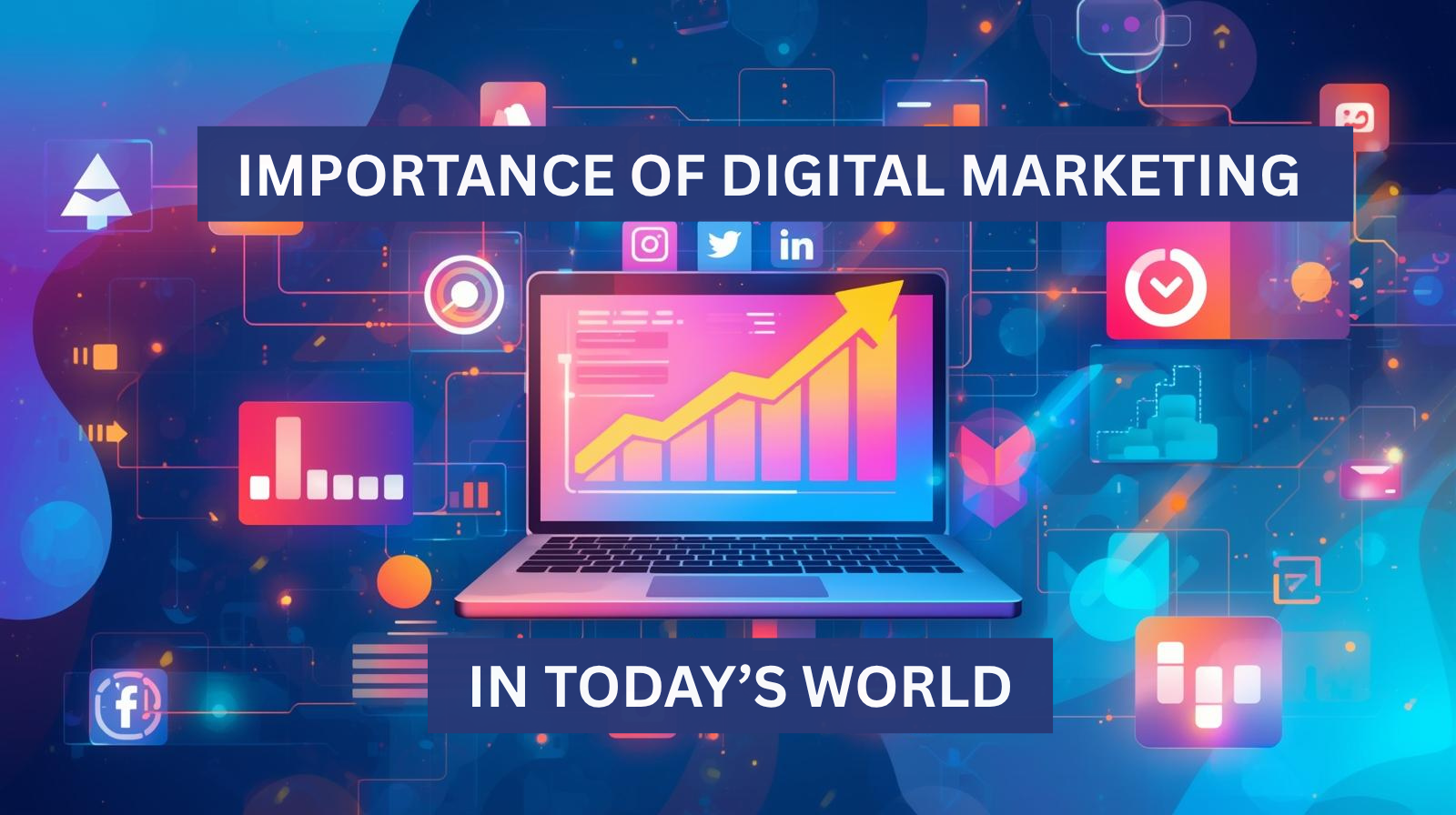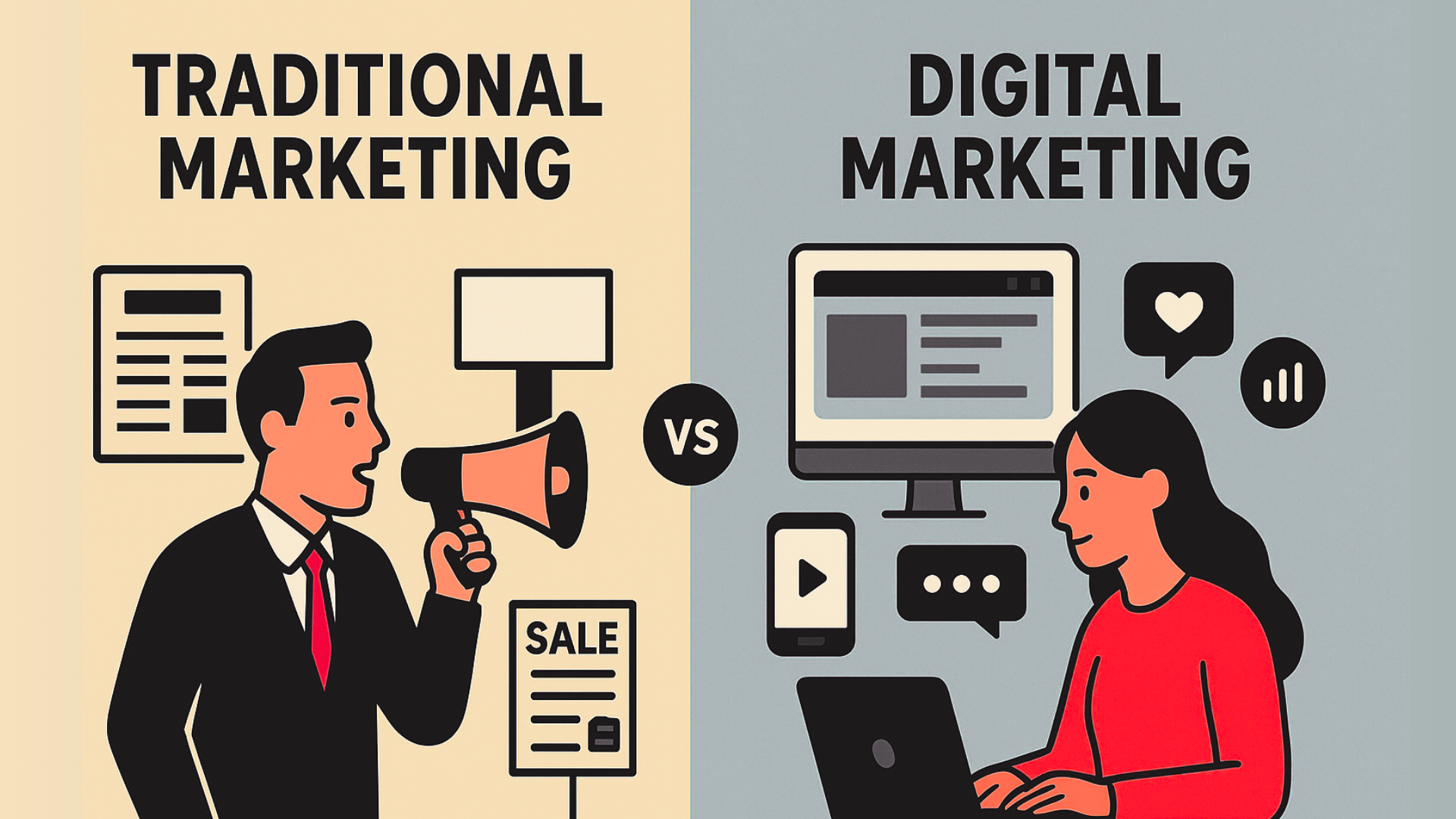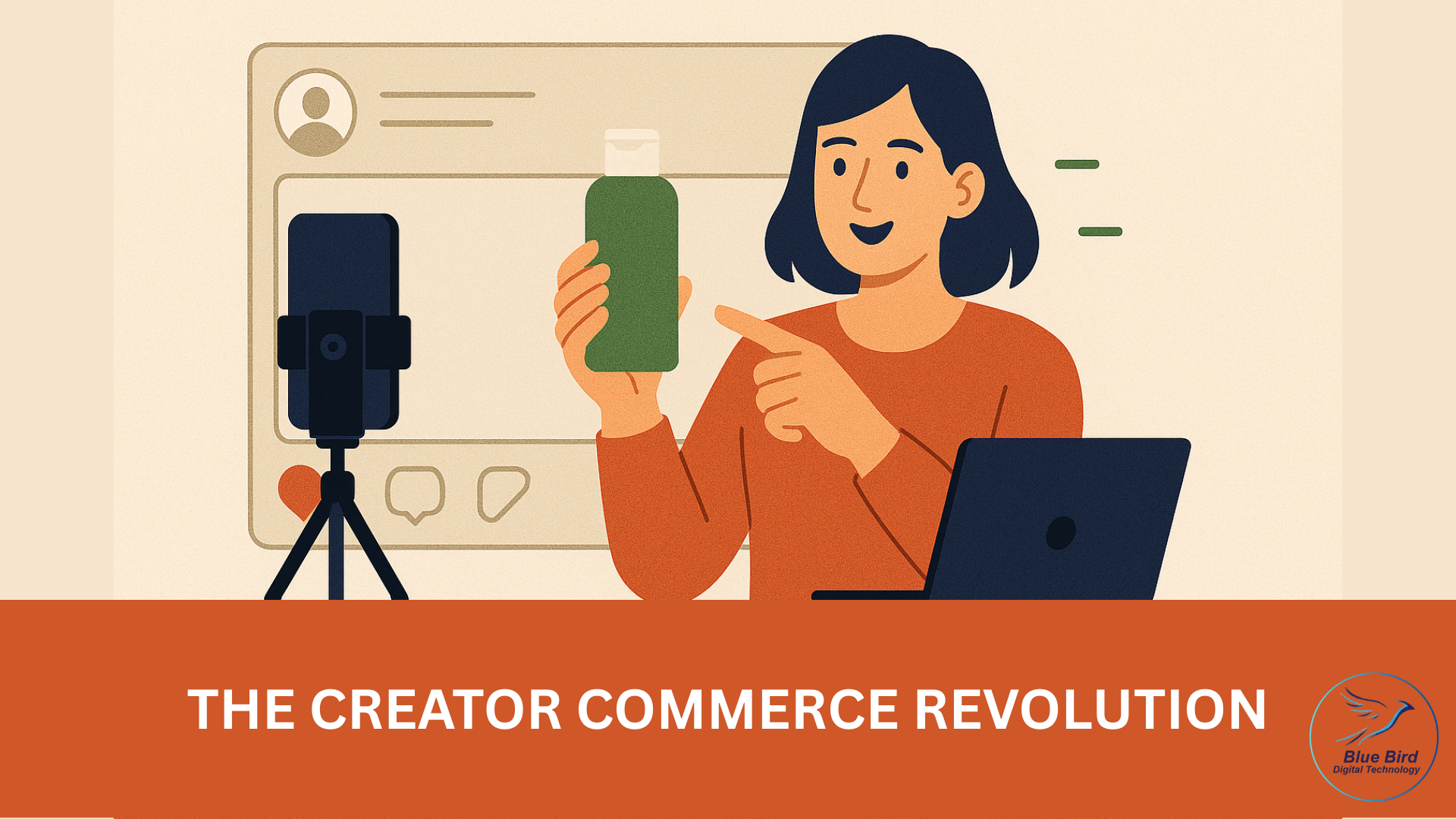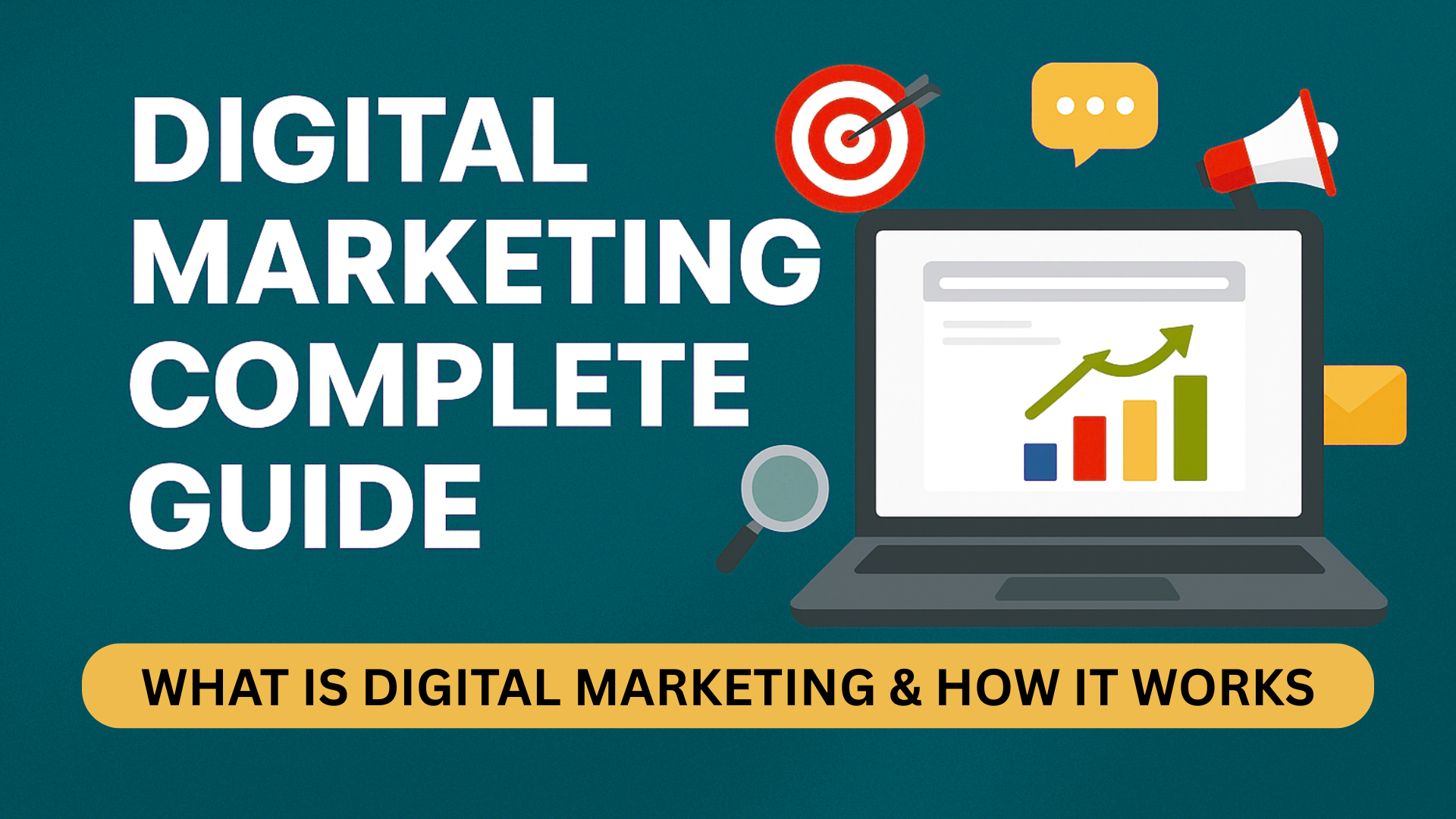Understanding the Importance of Digital Marketing
The importance of digital marketing in today’s world cannot be overstated.
In an era where every click, search, and scroll is an opportunity for a brand to connect with its audience, digital marketing has become the heart of modern business growth.
It combines creativity, data, and technology to help companies reach the right audience at the right time — across the right platforms. From Google ads to Instagram posts and email newsletters, every online touchpoint builds awareness, trust, and conversions.
What Is Digital Marketing?
Digital Marketing is the art and science of promoting products or services through digital channels such as search engines, websites, social media, and email.
It helps businesses grow by increasing visibility, generating leads, and driving sales — all while being measurable and cost-effective.
Simple Definition:
Digital marketing means using online technologies and strategies to promote and grow a business effectively.
The Evolution of Marketing: From Billboards to Browsers
Before the digital age, marketing revolved around print, radio, and television ads. These methods reached people, but results were hard to track.
The internet revolution transformed this forever, leading to a more interactive and measurable marketing ecosystem.
With the rise of the internet in the 1990s, marketing took a new turn:
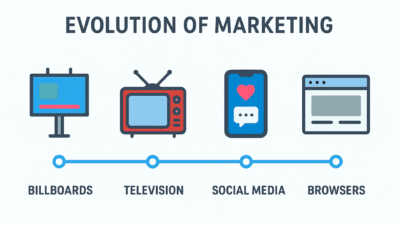
Evolution of Marketing from Billboards to Browsers
| Decade | Milestone | Impact |
|---|---|---|
| 1990s | Launch of Google, Yahoo, and first clickable banner ads | Start of search-based marketing |
| 2000s | Facebook, LinkedIn, and early social networks | Community-based brand growth |
| 2010s | Smartphones, Instagram, YouTube | Visual content and influencer marketing boom |
| 2020s | AI, automation, data analytics | Personalized and predictive marketing |
Why Digital Marketing Matters in 2025
The importance of digital marketing lies in its power to make brands visible and valuable in an online-first world. Whether you’re a small local business or a global company, your customers are already online — and so should you be.
Top Reasons Why It’s Essential:
-
Global Reach: Connect with audiences across continents instantly.
-
Cost-Effective: Run campaigns with any budget and scale based on results.
-
Targeted Marketing: Focus only on people most likely to buy from you.
-
Measurable Results: Track every click, impression, and conversion.
-
Two-Way Communication: Engage directly with customers via comments, messages, and reviews.
-
24/7 Visibility: Your brand works even when you sleep.
Example:
A small bakery in Mumbai can run Facebook ads targeting local dessert lovers within a 5 km radius — something impossible with traditional print ads.
How Digital Marketing Works
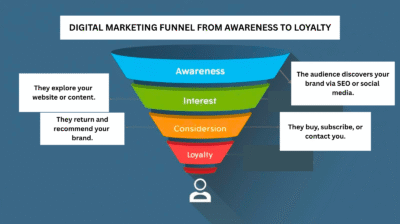
Stages of the Digital Marketing Funnel from Awareness to Loyalty
Every digital strategy works around a simple marketing funnel that converts strangers into loyal advocates.
The Digital Marketing Funnel:
-
Awareness: The audience discovers your brand via SEO or social media.
-
Interest: They explore your website or content.
-
Consideration: They compare your brand to others.
-
Conversion: They buy, subscribe, or contact you.
-
Loyalty: They return and recommend your brand.
The Core Pillars of Digital Marketing
For a digital marketing strategy to work, multiple components must align like gears in a machine. Let’s break them down.
1. Search Engine Optimization (SEO)
SEO improves your website’s visibility on Google and other search engines.
It involves keyword optimization, technical performance, and content quality.
Pro Tip: Use tools like Google Search Console, SEMrush, or Ahrefs to track performance.
2. Search Engine Marketing (SEM)
SEM includes paid advertisements (like Google Ads) to appear at the top of search results.
It’s perfect for quick visibility and targeting high-intent customers.
Example: A travel agency bidding for “best honeymoon packages in Bali.”
3. Content Marketing
“Content is King” — and in 2025, valuable, authentic content still rules.
From blogs and videos to podcasts and infographics, content builds trust and authority.
Tip: Use storytelling to humanize your brand and keep audiences engaged.
4. Social Media Marketing
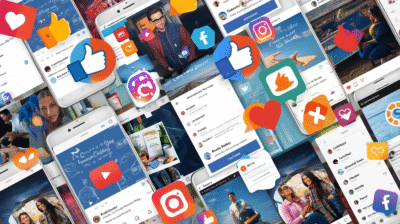
Social Media Platforms for Marketing Engagement
Social platforms like Instagram, LinkedIn, TikTok, and X (Twitter) are where conversations happen.
A strong social presence drives brand awareness, community building, and traffic.
5. Email Marketing
Despite being one of the oldest digital channels, email remains a conversion powerhouse.
Through personalized newsletters, you can nurture leads and drive sales.
Tool Tip: Mailchimp, HubSpot, or ConvertKit for automation.
6. Affiliate Marketing
Here, influencers or publishers promote your products in exchange for commissions.
This method expands your reach and adds third-party credibility.
7. Influencer Marketing
Collaborate with creators who already have your target audience’s attention.
Micro-influencers (with 10K–100K followers) often drive higher engagement than big names.
8. Analytics and Data
“What gets measured gets improved.”
Analytics tools show what’s working — and what’s not — allowing marketers to optimize campaigns.
Popular Tools: Google Analytics, Hotjar, Facebook Insights, HubSpot.
The Role of Data in Digital Marketing
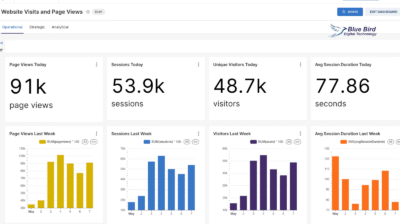
Data is the foundation of modern marketing. It helps brands deliver personalized experiences, measure ROI, and forecast trends.
Key Data Categories:
-
Demographics: Age, gender, location
-
Behavior: Pages visited, clicks, searches
-
Engagement: Likes, shares, comments
-
Conversions: Sales, leads, downloads
Digital Marketing for Different Business Models
| Model | Focus | Example Channels |
|---|---|---|
| B2B (Business-to-Business) | Lead generation & branding | LinkedIn, Email Marketing |
| B2C (Business-to-Consumer) | Emotional storytelling | Instagram, YouTube |
| D2C (Direct-to-Consumer) | Direct engagement | Shopify, Brand Apps |
Example:
Nike’s D2C strategy connects emotionally while promoting sales via the Nike App — a perfect demonstration of the importance of digital marketing in brand success.
Essential Skills for Modern Digital Marketers
Digital marketing success depends on balancing creativity with analytics — proving again the importance of digital marketing in building careers and businesses alike.
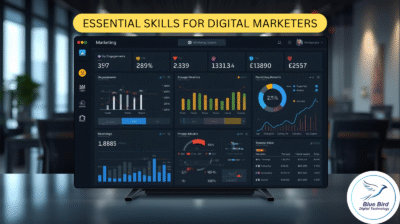
Essential Skills for Digital Marketers in 2025
Must-Have Skills:
-
Keyword Research & SEO
-
Copywriting & Storytelling
-
Graphic & Video Design
-
Social Media Strategy
-
Data Interpretation
-
Marketing Automation
-
Communication & Persuasion
Challenges in Digital Marketing
Despite the benefits, the digital world isn’t without challenges.
Common Hurdles:
-
Constant algorithm updates by Google or Meta.
-
High competition for every keyword.
-
Ad fatigue due to oversaturation.
-
Privacy laws limiting data collection (e.g., GDPR, CCPA).
How to Overcome:
Stay updated with trends.
Prioritize value over volume.
Use ethical marketing and respect user privacy.
Continuously test and adapt your strategies.
The Future of Digital Marketing: What’s Next?

AI-Driven Future of Digital Marketing
The digital landscape is changing faster than ever. Expect innovation in areas like:
-
AI-Powered Content: Automated yet personalized campaigns.
-
Voice Search Optimization: Adapting for voice assistants like Alexa or Siri.
-
AR/VR Experiences: Immersive brand storytelling.
-
Predictive Analytics: Anticipating customer needs before they act.
-
Sustainability Marketing: Brands aligning with eco-conscious values.
Digital marketing success depends on balancing creativity with analytics — proving again the importance of digital marketing in building careers and businesses alike.
To Learn More About Artificial Intelligence
Summary: Why Learning Digital Marketing Matters Today
The importance of digital marketing lies in its ability to connect businesses with customers in ways that were never possible before.
Whether you’re an entrepreneur, student, or marketer — mastering digital marketing can transform your future.
Key Takeaways:
-
Go digital or go invisible.
-
Combine creativity with analytics for maximum impact.
-
Keep learning and evolving with technology.
-
Build relationships, not just campaigns.
FAQs About Digital Marketing
Q1. Why is digital marketing important for small businesses?
Because it allows small businesses to compete with big brands through targeted, cost-effective campaigns.
Q2. Is digital marketing better than traditional marketing?
Yes. It offers measurable, real-time results and precise audience targeting that traditional methods cannot.
Q3. Which digital marketing channel works best in 2025?
It depends on your audience. SEO, social media, and email marketing remain top performers.
Q4. How can I start a career in digital marketing?
Start by learning the basics — SEO, content, and analytics — then gain hands-on experience through internships or freelancing.
Q5. What is the future of digital marketing?
AI, automation, voice search, and AR/VR experiences will define the next decade of digital engagement.
Conclusion
The world has gone digital — and so must your marketing.
Businesses that adapt to change, leverage data, and stay customer-focused will dominate 2025 and beyond.
Digital marketing isn’t just about selling; it’s about connecting, educating, and inspiring.
Start now, stay consistent, and your brand will become part of the next success story.


